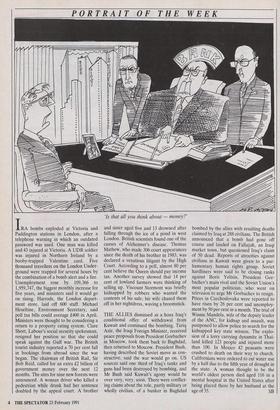PORTRAIT OF THE WEEK
'Is that all you think about — money?' IRA bombs exploded at Victoria and Paddington stations in London, after a telephone warning in which an outdated password was used. One man was killed and 43 injured at Victoria. A UDR soldier was injured in Northern Ireland by a booby-trapped Valentine card. Five thousand travellers on the London Under- ground were trapped for several hours by the combination of a bomb alert and a fire. Unemployment rose by 109,366 to 1,959,747, the biggest monthly increase for five years, and ministers said it would go on rising. Harrods, the London depart- ment store, laid off 600 staff. Michael Hese'tine, Environment Secretary, said poll tax bills could average £400 in April. Ministers were thought to be considering a return to a property rating system. Clare Short, Labour's social security spokesman, resigned her position so that she could speak against the Gulf war. The British tourist industry reported a 70 per cent fall in bookings from abroad since the war began. The chairman of British Rail, Sir Bob Reid, called for an extra £2 billion of government money over the next 12 months. The sites for nine new forests were announced. A woman driver who killed a pedestrian while drunk had her sentence doubled by the appeal court. A brother and sister aged five and 13 drowned after falling through the ice of a pond in west London. British scientists found one of the causes of Alzheimer's disease. Thomas Mathew, who made 306 court appearances since the death of his brother in 1983, was declared a vexatious litigant by the High Court. According to a poll, almost 80 per cent believe the Queen should pay income tax. Another survey showed that 14 per cent of lowland farmers were thinking of selling up. Viscount Stormont was briefly kidnapped by robbers who wanted the contents of his safe; his wife chased them off in her nightdress, waving a broomstick.
THE ALLIES dismissed as a hoax Iraq's conditional offer of withdrawal from Kuwait and continued the bombing. Tariq Aziz, the Iraqi Foreign Minister, received peace proposals from President Gorbachev in Moscow, took them back to Baghdad, then returned to Moscow. President Bush, having described the Soviet move as con- structive, said the war would go on. US sources said one third of Iraq's tanks and guns had been destroyed by bombing, and Mr Bush said Kuwait's agony would be over very, very, soon. There were conflict- ing claims about the role, partly military or wholly civilian, of a bunker in Baghdad bombed by the allies with resulting deaths claimed by Iraq at 288 civilians. The British announced that a bomb had gone off course and landed on Fallujah, an Iraqi market town, but questioned Iraq's claim of 50 dead. Reports of atrocities against civilians in Kuwait were given to a par- liamentary human rights group. Soviet hardliners were said to be closing ranks against Boris Yeltsin, President Gor- bachev's main rival and the Soviet Union's most popular politician, who went on television to urge Mr Gorbachev to resign. Prices in Czechoslovaka were reported to have risen by 26 per cent and unemploy- ment by 50 per cent in a month. The trial of Winnie Mandela, wife of the deputy leader of the ANC, for kidnap and assault, was postponed to allow police to search for the kidnapped key state witness. The explo- sion of a lorry carrying dynamite in Thai- land killed 123 people and injured more than 100. In Mexico 42 peasants were crushed to death on their way to church. Californians were ordered to cut water use by a half due to the fifth year of drought in the state. A woman thought to be the world's oldest person died aged 116 in a mental hospital in the United States after being placed there by her husband at the


















































 Previous page
Previous page